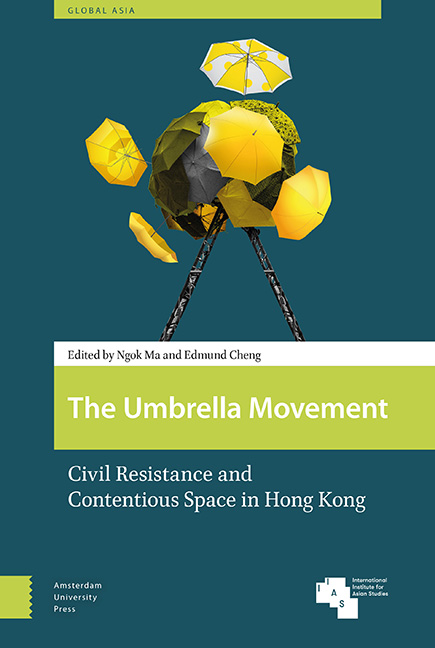Book contents
- Frontmatter
- Contents
- Acknowledgements
- Introduction: Civil Resistance and Contentious Space in Hong Kong
- Part A Trajectory and Contingency
- Part B Repertories and Strategies
- Part C Regime and Public Responses
- Part D Comparative Perspectives
- Appendix: The Umbrella Movement—Chronology of Major Events
- Index
- Publications/Global Asia
4 - Perceived Outcomes and Willingness to Retreat among Umbrella Movement Participants
Published online by Cambridge University Press: 21 November 2020
- Frontmatter
- Contents
- Acknowledgements
- Introduction: Civil Resistance and Contentious Space in Hong Kong
- Part A Trajectory and Contingency
- Part B Repertories and Strategies
- Part C Regime and Public Responses
- Part D Comparative Perspectives
- Appendix: The Umbrella Movement—Chronology of Major Events
- Index
- Publications/Global Asia
Summary
Abstract
Conventionally, it is believed that people are more likely to participate in protests if positive outcomes are probable. However, the significance of instrumental rationality seems to be weak in various occupation movements around the world. Against this background, we ask: How did the Umbrella Movement participants perceive the likelihood of various outcomes? How did such perceptions influence their preferred movement strategies? An analysis of onsite protest survey data shows that the majority of participants were not optimistic about the chances of achieving their goals. However, perceived likelihood of getting different types of government concessions indeed affected willingness to retreat, though the influence depended on the configuration of perceived outcome likelihood. The article discusses the place of instrumental rationality in the Umbrella Movement and the conceptualization of perceived outcomes in studies of protests.
Keywords: perceived outcomes, willingness to retreat, major vs. minor concessions, configurative view on perceived outcomes, instrumental rationality in protests
Introduction
Social movements are goal-oriented actions undertaken by people aiming to achieve personal benefits, group advantages, public goods, and/or social justice. The likelihood of achieving the desired goals thus constitutes a major factor influencing the emergence of specific movements (McAdam, 1982) and individuals’ willingness to participate in collective action (Klandermans, 1997). After a collective action campaign begins, participants and activists are likely to continually re-evaluate the probabilities of various outcomes (Einwohner, 2002). Such evaluations may then shape people's willingness to persist and their judgments of what strategies the movement should adopt (Corrigall-Brown, 2012).
The conventional arguments listed above highlight the role of instrumental rationality in protests. This emphasis on instrumental rationality has been a staple in social movement studies since at least the 1970s (McCarthy and Zald, 1977). However, there are also times when people protest even though the possibility of success is slim, and there are protests and movements that are seemingly not driven by cost-benefit calculations. Specifically, the wave of large-scale occupation protests around the world since 2011, such as the Arab Spring and Occupy Wall Street, has taken on new characteristics (Castells, 2012) and arisen based on a different “action logic” (Bennett and Segerberg, 2013). In this wave of protests, perceived chances of success and cost-benefit calculations were seemingly replaced by spontaneous actions based on shared outrage and an urge to express it.
- Type
- Chapter
- Information
- Umbrella MovementCivil Resistance and Contentious Space in Hong Kong, pp. 101 - 124Publisher: Amsterdam University PressPrint publication year: 2019



